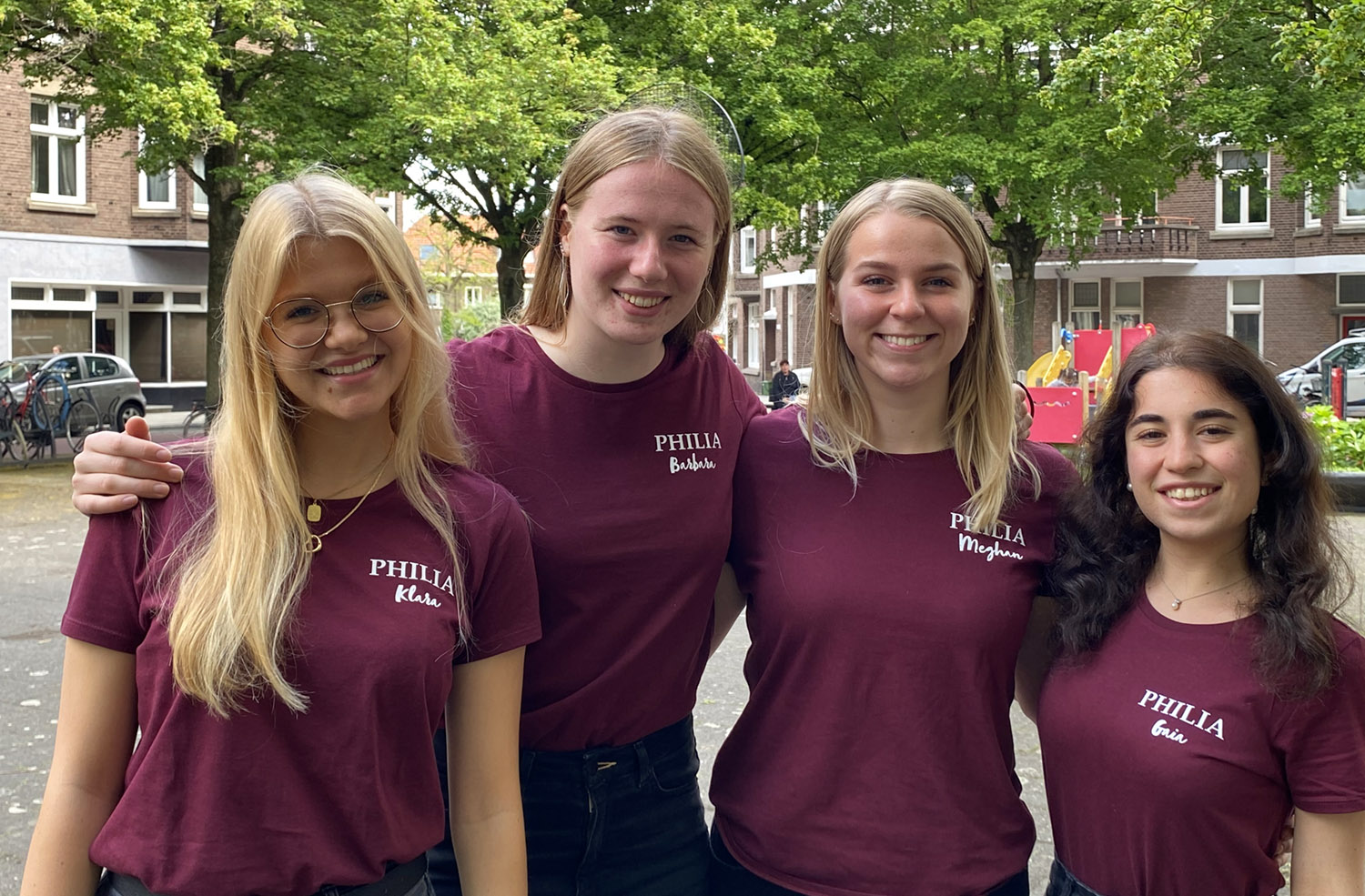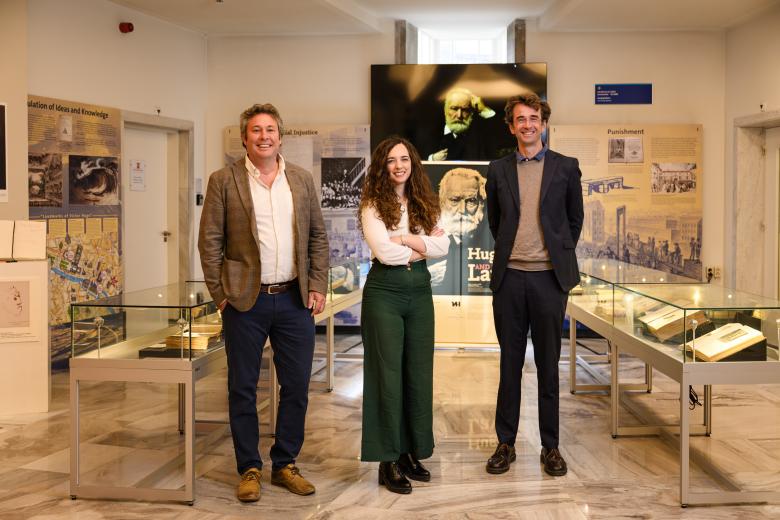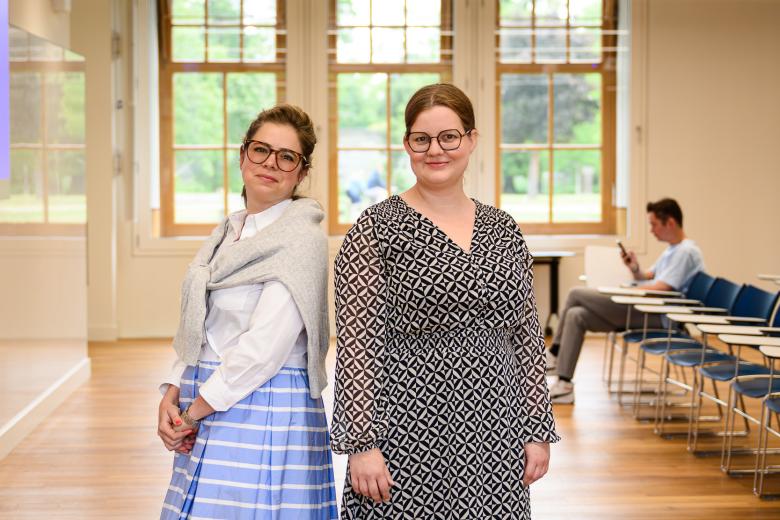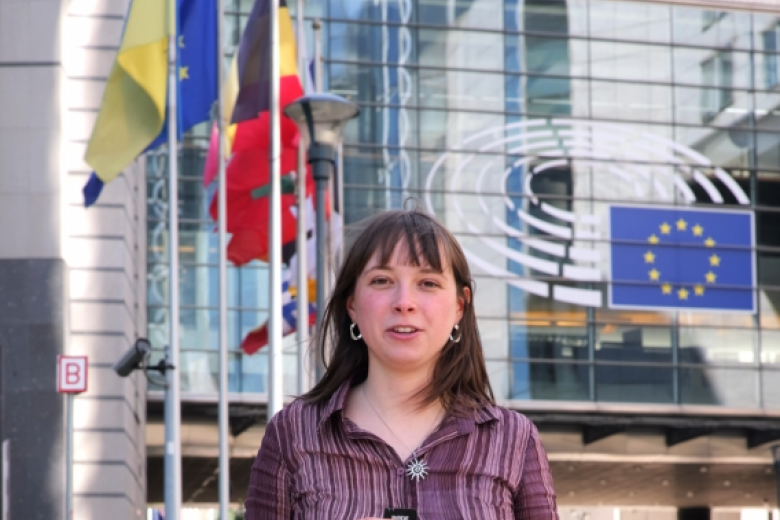Meet Philia - the first international sorority
Maastricht’s student life is clicking into gear again – and getting a little richer and more inclusive. Global Studies first years Meghan Callender, Klara Riehle and Barbara Paro are setting up a new international sorority: Philia. They want to offer sports, international cuisine, cultural exchange, as well as a social and educational programme.
“It was just a Google search,” they admit and laugh – a very 21st century way of picking an ancient Greek term meaning friendship or affection. Meghan Callender from the US, Klara Riehle from Germany and Barbara Paro from the Netherlands know each other from the pioneer cohort of UM’s new bachelor’s programme Global Studies.
While that programme, and UM more broadly, might have pre-selected for those with a more international and inclusive outlook, Meghan explains that “it’s not tied to Global Studies in any way but the values of being open and interested in changing things for the better are overlapping with what we’re trying to do.”
A Dutch tradition
Barbara explains that student associations (studentenverenigingen) are common throughout the Netherlands but that independent sororities and fraternities (disputen, originally debating clubs) are particular to Maastricht. “It’s great for having a rich social life, a close group of friends and also for forming connections that will be useful for your career.”
Klara spent her own introduction month with Saurus, a student association with a focus on rowing. “They are all very welcoming and open to internationals but they also speak Dutch a lot – which makes sense of course and I do want to learn the language – but at that point, it made me feel left out.”
Meghan has had similar experiences: “When I tried to join a sorority, I didn’t get the sense that they were very interested – even though I speak Dutch. We looked around and thought it was strange that, even though UM is 50% international students, there weren’t really sororities or student associations for them. So we thought we might as well start one ourselves!”
(text continues below the image)

Corona as a midwife
The corona crisis, which has dominated their student experience so far, was particularly hard on internationals, as Klara remembers: “People were more afraid that they wouldn’t be able to integrate socially, to meet people during their first year and have the kinds of opportunities and activities that come with being part of a group.”
“It definitely motivated us to start the sorority,” adds Meghan, “I think in a regular year, you can always find other ways to spend your time and meet your social needs. The lockdown also meant that we had a lot of time to work on it, since there was not much else to do.” With a lot of hard work came also the creative freedom to set the direction and values of Philia.
“We all love sports,” says Barbara, “so that will also be one of the features of the sorority – you don’t have to be good, just keen to try it! But we also share a sense of social responsibility, so, for example, if we have a trip to the seaside for a weekend of sports and party, we will also clean the beach.” Klara adds that contrary to the many negative stereotypes around sororities, they also want to organise educational events, and chances for voluntary work.
Have a good time together – and learn from each other
Another a priori core value is inclusivity. “We are aiming to be international and we want to celebrate diversity, the fact that we all have different languages, cultures and traditions. We want to learn from each other,” says Meghan, adding, “and obviously we want to have a good time together.”
The team have put in a lot of hard work to make the good time possible – but they have also received plenty of help. “Initially, we asked our programme directors, Lutz Krebs and Saskia Van Bergen,” Barbara remembers. “They were amazingly helpful; they know how the university works and could guide us on our first steps.” Krebs also got them in touch with Rector Rianne Letschert, who was enthusiastic enough about the idea to become Philia’s patroness.
“Its’ really awesome! Obviously it’s great to have access to her network but it’s also a real privilege to get to know her personally,” says Meghan and describes Letschert as “really nice and a female role model, someone to look up to.”
There are still a lot of administrative challenges ahead, from finding sponsors, to filling the calendar, and, of course, designing the auditioning process for prospective members. “But that’s still a secret!” says Klara and adds: “We don’t want rush things; we really want to get to know people before admitting them and then build something meaningful with a small group.”
By Florian Raith
Also read
-
Where Law Meets Pop Culture: A Creative Space for Exploration
From hip-hop to Victor Hugo, and historical fiction to classic cinema: What do these things have in common with the study of law, you might think? At Maastricht University’s Faculty of Law, a growing group of researchers and students is exploring exactly that and even more.

-
Innovative Education in Personal and Family Law
Thanks to the SURF Incentive Scheme for Open and Online Education (still available at the time), Gwen Noteborn (university lecturer in personal and family law at Maastricht University), Claudia Hocks and Janneke Hendrix (lecturers in law at Zuyd University of Applied Sciences) were able to get...

-
Europe Day
To celebrate Europe Day on 9 May, FASoS student Lisa travelled to Brussels to meet with five of our inspiring alumni who are currently shaping European policy and advocacy. In this video, they share why Europe Day matters, how it’s celebrated in Brussels, and what the idea of Europe means to them.
